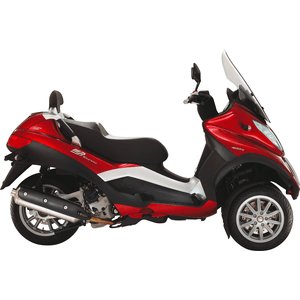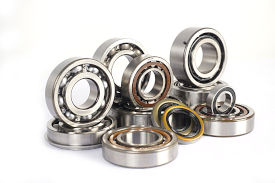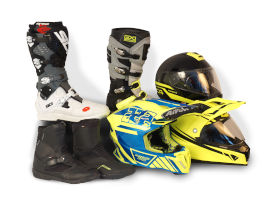Piaggio MP3 400 HPE [2020-2022] Review: The Three-Wheeled Revolution Gets Refined
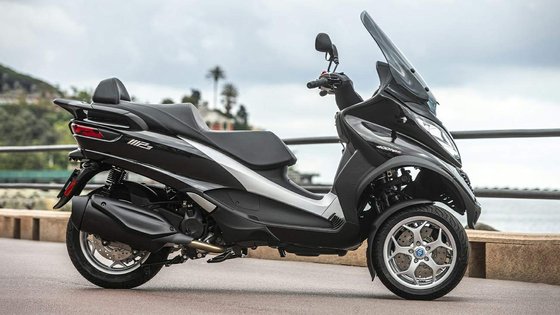
Introduction
The Piaggio MP3 400 HPE isn’t just a scooter—it’s a statement. Since its debut in 2006, the MP3 series has redefined urban mobility with its daring three-wheeled design, blending car-like stability with scooter agility. The 2020-2022 generation takes this legacy further, refining performance, tech, and comfort to create a machine that’s as practical for daily commutes as it is thrilling for weekend escapes. After spending time with this modern iteration, it’s clear Piaggio hasn’t just updated the MP3—they’ve sharpened its identity as the ultimate urban adventurer.
Design & Ergonomics: Where Automotive Meets Two-Wheeled Soul
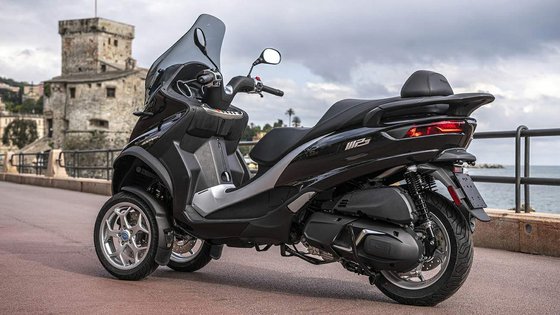
The MP3 400 HPE’s design leans into its automotive inspiration with a bold, sculpted front fascia. The horizontal LED headlight cluster and honeycomb grille give it a sporty, almost futuristic face, while the twin 13-inch front wheels—exposed beneath color-matched fenders—hint at its technical prowess. Piaggio’s attention to detail shines in the gloss finishes (Nero Lucido or Grigio Materia) and subtle touches like the grey alloy wheels and stitched saddle.
At 790 mm (31.1 inches), the seat height is accessible for most riders, and the redesigned ergonomics strike a balance between relaxed cruising and urban agility. The handlebars are positioned 10 mm higher and 20 mm closer to the rider compared to earlier models, creating a natural upright posture. The floorboards are spacious enough to shift your feet during long rides, and the 31-liter under-seat storage—large enough for two full-face helmets—is a game-changer for practicality.
Riding Experience: Stability Meets Surprising Agility
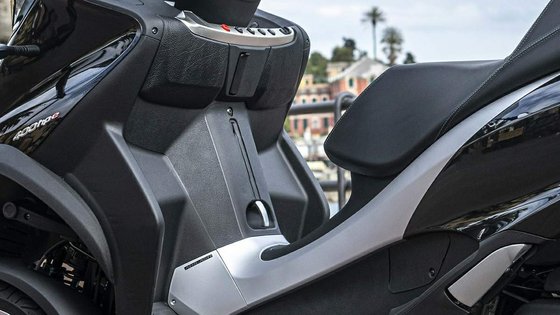
Fire up the 399 cc single-cylinder, and the first thing you notice is the absence of vibrations—a testament to Piaggio’s refinements like the lightweight aluminum piston and Positive Crankcase Ventilation (PCV) system. The 35.3 HP engine delivers smooth acceleration, hitting 0-60 km/h (37 mph) in under 5 seconds, with torque peaking at 37.7 Nm (27.8 lb-ft). It’s no hyper-scooter, but the MP3 thrives in the 50-110 km/h (31-68 mph) range, making highway merges feel effortless.
The magic, however, lies in the chassis. The dual front wheels and quadrilateral suspension system inspire confidence mid-corner, leaning up to 40 degrees without a hint of wobble. On rain-slicked roads, the triple-disc brakes (dual 258 mm front, 240 mm rear) paired with ABS and ASR traction control keep things planted. But it’s the suspension lock that steals the show—hit a red light, engage the system, and the MP3 stands upright without a kickstand. No more awkward tiptoeing at stops.
Technology: Smarter Than Your Average Scooter
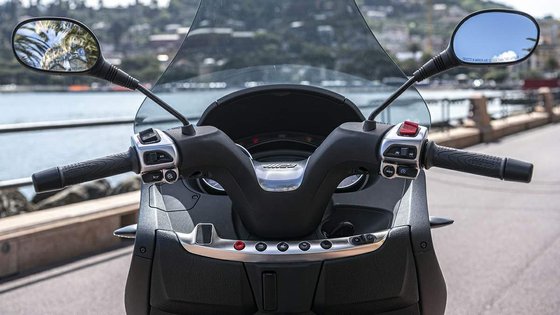
Piaggio’s 7-inch TFT dashboard is the crown jewel here. Beyond the usual speed and fuel data, it offers real-time consumption stats, navigation prompts (via Piaggio MIA app), and even torque/power curves. The keyless ignition and electrically operated seat add a touch of luxury, while the optional ARAS system on higher trims introduces blind-spot monitoring—a first for scooters.
The PIAGGIO MIA connectivity isn’t just a gimmick. Pair your smartphone, and the system logs trip data, offers maintenance reminders, and even helps locate your parked MP3 via GPS. For tech-savvy riders, it’s a seamless extension of the riding experience.
Competition: How the MP3 400 Stacks Up
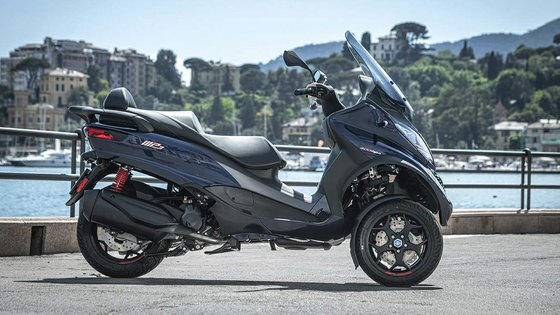
1. Yamaha TMAX 560
The TMAX is the sport-touring titan with 47 HP and a premium price tag. While it outpaces the MP3 on power, it lacks the three-wheeled confidence and can’t match the Piaggio’s storage or low-speed stability.
2. BMW C 400 GT
BMW’s 350 cc contender offers similar tech (10.25-inch TFT, ASC traction control) but feels cramped for taller riders. The MP3’s suspension lock and wider floorboards make it more versatile for city crawling.
3. Honda Forza 750
A maxi-scooter with 58 HP, the Forza excels on highways but feels bulky in traffic. The MP3’s narrower profile and tighter 1560 mm (61.4-inch) wheelbase make it a lane-splitting champion by comparison.
Verdict: The MP3 400 HPE carves its niche with unrivaled stability and innovative features. It’s not the fastest, but it’s the smartest choice for riders prioritizing safety and urban agility.
Maintenance: Keeping Your MP3 in Peak Shape
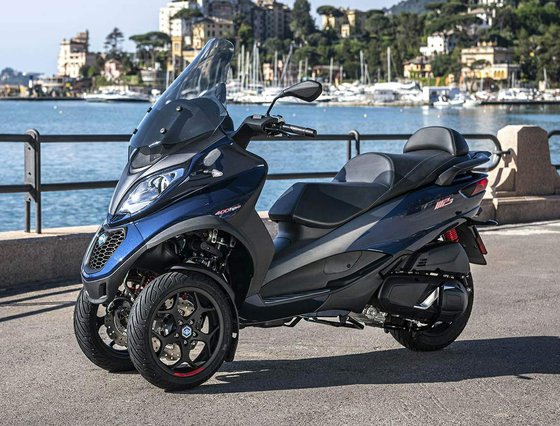
Oil & Fluids
- Engine Oil: Use SAE 5W-40 (API SL) – 1.4L with filter changes every 8,000 km (5,000 miles).
- Coolant: Replace every 24,000 km (15,000 miles) with ethylene glycol-based fluid.
- Brake Fluid: DOT 4 synthetic – flush every 2 years.
Valve Adjustments
Check valve clearance every 20,000 km (12,400 miles):
- Intake: 0.10 mm (0.004 in) cold
- Exhaust: 0.15 mm (0.006 in) cold
Tire Pressures
- Front: 2.0 bar (29 psi)
- Rear: 2.4 bar (35 psi) when solo; 2.6 bar (38 psi) with passenger.
Pro Tip: The CVT belt lasts ~25,000 km (15,500 miles). Inspect for cracks and replace with MOTOPARTS.store’s high-torque kits to enhance longevity.
Conclusion: A Scooter That Thinks Differently
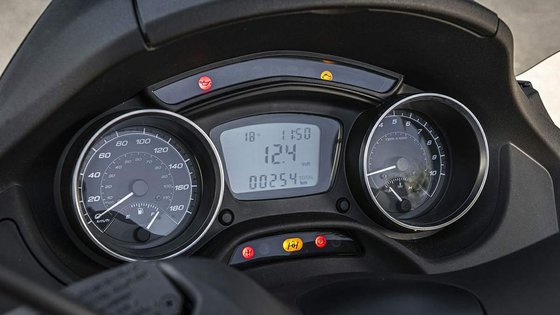
The Piaggio MP3 400 HPE isn’t just transportation—it’s a reimagining of what urban riding can be. From its parking wizardry to the confidence-inspiring triple discs, every detail caters to riders who refuse to compromise. Whether you’re filtering through gridlock or carving coastal roads, this scooter makes every journey an event. And when it’s time for upgrades, MOTOPARTS.store has the oils, belts, and accessories to keep your MP3 defying conventions for years to come.








Specifications sheet
| Engine | |
|---|---|
| Stroke: | Four-stroke |
| Ignition: | Electronic with inductive exhaust, traction control (ASR) |
| Max power: | 26 kW | 35.0 hp |
| Max torque: | 38 Nm |
| Fuel system: | Electronic fuel injection |
| Lubrication: | Dry sump |
| Max power @: | 7500 rpm |
| Displacement: | 399 ccm |
| Max torque @: | 5750 rpm |
| Configuration: | Single |
| Cooling System: | Liquid cooled |
| Compression ratio: | Euro 5 compliant |
| Number of cylinders: | 1 |
| Dimensions | |
|---|---|
| Wheelbase: | 1560 mm (61.4 in) |
| Wet weight: | 257 |
| Seat height: | 790 mm (31.1 in) |
| Overall width: | 800 mm (31.5 in) |
| Overall length: | 2200 mm (86.6 in) |
| Fuel tank capacity: | 13.7 L (3.61 US gal) |
| Drivetrain | |
|---|---|
| Clutch: | Centrifugal multi-plate wet clutch |
| Final drive: | belt |
| Transmission: | CVT with torque server |
| Maintenance | |
|---|---|
| Engine oil: | 5W40 |
| Brake fluid: | DOT 4 synthetic |
| Gearbox oil: | 500 ml 80W-90 GL-4 |
| Spark plugs: | NGK MR7BI-8 |
| Coolant capacity: | 1.8 |
| Engine oil capacity: | 1.4 |
| Engine oil change interval: | Every 5000 km or 2 years |
| Valve clearance (intake, cold): | 0.10 mm |
| Valve clearance (exhaust, cold): | 0.15 mm |
| Recommended tire pressure (rear): | 2.4 bar (35 psi) solo, 2.6 bar (38 psi) with passenger |
| Recommended tire pressure (front): | 2.0 bar (29 psi) |
| Additional Features | |
|---|---|
| ABS: | Integrated with braking system |
| Lighting: | LED Daytime Running Lights |
| Instrumentation: | 7" TFT display with connectivity (PIAGGIO MIA) |
| Traction control: | ASR (Acceleration Slip Regulation) |
| Chassis and Suspension | |
|---|---|
| Frame: | Double cradle in high-strength tubular steel |
| Rear rim: | 14 x 4.00 |
| Front rim: | 13 x 3.00 |
| Rear tire: | 140/70-14 |
| Front tire: | 2 x 110/70-13 |
| Rear brakes: | Single 240 mm disc, 1-piston caliper (ABS) |
| Front brakes: | 2 x 258 mm discs, 2-piston calipers (ABS) |
| Rear suspension: | Dual hydraulic shock absorber with pre-adjusted spring (4 positions) |
| Front suspension: | Articulated quadrilateral, electro-hydraulic suspension blocking system |
| Rear wheel travel: | 102 mm (4.0 in) |
| Front wheel travel: | 85 mm (3.3 in) |



